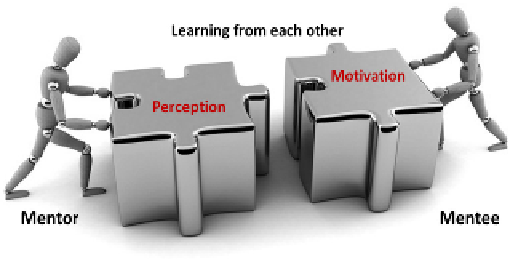Information Technology Reference
In-Depth Information
Fig. 1.
Representation of two pieces of the mentoring relationship puzzle
Effective communication is essential to build a trustworthiness mentoring
relationship. If the mentorship includes a young mentee, he usually has to learn how
to communicate successfully and often rely on his mentors to take the lead to teach
how to communicate in this unique relationship [2, 3].
Both mentee and mentors can experience good and bad things in a mentoring
relationship. Good mentoring experiences for mentees are those associated with two
distinct types of support. The career-related support includes several specific
mentoring functions, which enhance the mentee's professional development (e.g.,
exposure and visibility, sponsorship, and coaching). Psychosocial support consists of
several specific mentoring actions, which guide the protégée in the building of his
self-efficacy, self-worth, and professional identity (e.g., friendship, acceptance,
confidence and confirmation). For mentees, good mentoring experiences predict a
wide range of outcomes including psychological well-being, job and career attitudes,
career success, and relationship satisfaction [4, 5]. Mentors can also have good
mentoring experiences. For example, mentors report feelings of personal satisfaction
from helping their postgraduate students. They believe that are contributing to future
generations, by providing their knowledge and experience. Mentors may also report
enhanced job performance if mentees use their technical skills when requested,
receiving in exchange organizational recognition for their efforts. Good mentoring
experiences are positively associated with mentor reports of relationship quality and
stronger intentions to mentor in the future [6]. The bad experiences can also influence
the mentoring relationship, as discussed in Eby and co-authors [6]. However, this
topic will be not discussed here since it is not under the scope of this work.
Thereby, and to address the issue of postgraduate engineering programs students'
point of view on mentoring relationships, a main research question was formulated:
R.Q.: '
How the role of a mentor is perceived in advanced engineering education
?'
This question leads to a set of sub-questions, namely:
R.S.Q.1: '
What are the key-factors in the mentoring relationship in advanced
engineering education
?'
R.S.Q.2: '
Among the identified key factor, which is the most likely to have more
influence in the mentoring relationship
?
And less
?'

Search WWH ::

Custom Search